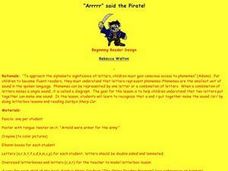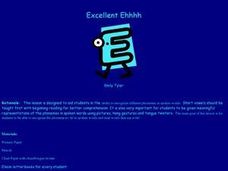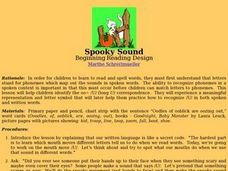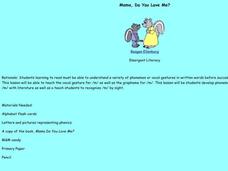Curated OER
"Ehh?" Says Grandpa Edward"
Students engage in an emergent literacy lesson that focuses on phonemic awareness. This lesson plan helps students to identify the correspondence e=/e/ by recognizing the sound of an elderly person ¿¿¿eh?¿¿¿ throughout words.
Curated OER
Build Fluency /A/
Students are introduced to the letter "A" and play a game to reinforce the printed and sound recognition of the letter "A." In this letter "A" lesson, students observe the teacher model the letter card game. Students participate in...
Curated OER
"Poppy P"
Students engage in a lesson of emerging literacy that focuses on phonemic awareness. The phoneme for the letter "p" is chosen for the lesson and students must acquire the skill of letter recognition also.
Curated OER
Yellowish Fish
Students engage in an emergent literacy lesson plan in order to obtain the skill of phoneme awareness to become better readers. They practice blending different phonemes in order to eventually form words.
Curated OER
OOOhhhh, My Toe!!!!
Students examine the /O/ phoneme by examining words and reciting a tongue twister. They practice writing the letter 'O' on their dry erase boards. While they listen to a read aloud of "Bo and Rose" they form the /O/ with their mouths...
Curated OER
Mmmmmm Mmmmmm Yum!
Students engage in an emergent literacy lesson that focuses on phonemic awareness. The importance of the letter to sound relationship is stressed in the lesson. The letter "m" is the target phoneme for students to master.
Curated OER
Aaaaa! I'm at the Doctor
Students develop Phoneme awareness of a letter. They explore pictures, hand gestures, tongue twisters, and sounding out the letter. The i will be represented through a picture of an i and students circle the words with the...
Curated OER
Aaa-aaa-aaa-choo!!
Students study the /a/ sound by mimicking the sound one makes when they sneeze. Next they work with a tongue twister, which they recite while stretching out the initial short a sound. Next, they practice writing the letter and read "A...
Curated OER
"Arrrrr" said the Pirate
Students practice decoding r-controlled vowels. Through various activities, they identify the change made to a vowel sound by adding "r." They decode words and spell them using Elkonin boxes. To conclude the lesson, students identify...
Curated OER
Excellent Ehhhh
Students make the different e sounds and practice a chant about the e sounds. They use a letterbox to write different words utilizing the e sounds. They listen to a story about a dog named Red that emphasizes the e sound. They write a...
Curated OER
Spooky Sound
First graders explore the concept of vowel digraphs. They distinguish between the sound made by one vowel and two vowels. Through listening, matching, and writing activities, 1st graders identify the sound in words and sentences they...
Curated OER
The Fish Say Shhh
First graders identify the digraph /sh/ in written and spoken language. Students practice the production of the /sh/ sound through tongue twisters and riddles. They identify the initial and final placement of the new digraph /sh/ using a...
Curated OER
Ewww, That's Gross
Students recognize the /ew/ digraph in written and spoken words by reading and spelling words with ew=/oo/. They say a tongue twister emphasizing words with the /ew/ digraph. They then listen to the story "Shoe Man" and identify the...
Curated OER
Shhh Here and There
Students identify words containing the sh digraph in this lesson. They say a tongue twister which contains words emphasizing the sh digraph. They then read with a partner "One Fish, Two Fish, Red Fish, Blue Fish" and identify words in...
Curated OER
Meet Lee, the Sleepy Bee
First graders distinguish between the different ways to create the sound for long vowel e. They are introduced to the vowel patterns that comprise long vowel sounds. They practice reading and spelling a variety of words containing the...
Curated OER
Wade Swayed At the Masquerade
Students practice reading words with vowel patterns that change the sound of the vowel. After reviewing the short vowel sound /a/, they are introduced to the vowel-consonant-e pattern that changes the short vowel sound into a long vowel...
Curated OER
Oh! Let's Go Home
Students distinguish between short vowel o and long vowel o. They are introduced to the vowel-consonant-e pattern that changes short vowel sounds into long vowel sounds. They practice reading and spelling words with the vowel-consonant-e...
Curated OER
Champions of /Ch/
Students identify the digraph /ch/ in written and spoken language. Students practice identifying initial and final placement of the digraph /ch/ in words by identifying pictures containing the sound. They decode and spell words in with...
Curated OER
I'm going to chase you
First graders identify the digraphs in written and spoken language. After a brief discussion of the combinations of /c/ and /h/ that comprise the /ch/ digraph, 1st graders practice identifying initial and final placement of the digraph...
Curated OER
Beat the Heat
First graders are introduced to the concept of vowel digraphs. They identify the digraph /ea/ in written and spoken language. After a brief discussion, 1st graders apply the rule for identifying and spelling words containing the /ea/...
Curated OER
BL to the Ends (blends)
Students examine word blends. For this word blends lesson, students investigate common word blends. Working in pairs, students analyze words containing blends and generate a word list.
Curated OER
Hi, My Name is A
Students distinguish between short vowel a and long vowel a. They are introduced to the vowel-consonant-e pattern that changes short vowel sounds into long vowel sounds. They practice decoding pseudo words with the vowel-consonant-e...
Curated OER
Mama, Do You Love Me?
Students complete a variety of activities related to the /m/ sound. As a class, they recite a tongue twister, and play the "I Spy" game for the letter M. Students then listen to the book "Mama, Do You Love Me?" and identify words in...
Curated OER
Spelling with Vowels
Students practice spelling words with vowels. In this letter sound and identification lesson, students learn all the vowels and their vowel sounds. Students spell words with vowels and fill in missing letters.

























